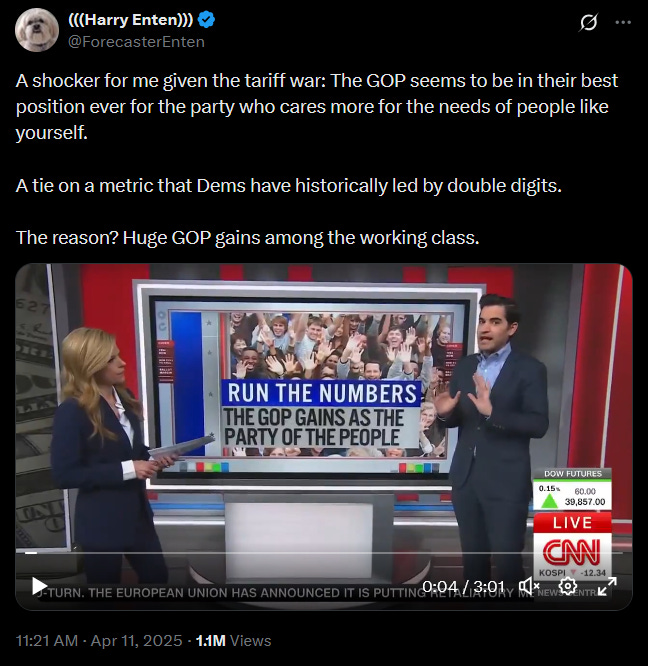Globalism Gets Testy Amid America's Trade Reset
75+ countries are talking about lowering trade barriers on U.S. exports, after the 'Liberation Day' tariffs landed. China's response left it isolated, and increasingly hostile. The week's missive.
By many hard data measures, this was one of the best weeks in financial markets in at least two years — even if it was a wild ride to get there.
After five years of skyrocketing cost of living for all Americans, core rates of inflation fell, the producer price index dropped, and oil prices were down.
All very good signs.
"Gasoline prices are expected to continue to decline with the falling oil prices that we have seen over the last week," said Andy Lipow, president of Lipow Oil Associates.
Markets closed up on a turbulent week amid some adjusting — call it a transition — to new realities on American trade terms after the “Liberation Day” tariffs President Trump announced last week.
The tariffs say this: “we will charge you what you charge us for access to your markets.” After decades of profiting from offshoring American jobs and manufacturing to cheap and near-slave labor countries, multi-national corporations spent the week calculating the new reality.
After the administration announced the lifting of “reciprocal” tariffs on trading partners for 90 days so the White House economic team could field phone calls from 75 countries looking to re-negotiate their non-tariff barriers, markets soared. Baseline tariffs of 10% remained in place.
By Friday, China had slapped 125% tariffs on U.S. exports and the U.S. had brought theirs to 145% on Chinese goods. Bond markets were in a sell-off that brought benchmark 10-year and 30-year Treasury yields to 4.5%. Analysts were tracking whether China was dumping U.S. treasuries in retaliation.
An estimated 25% to 30% of China’s Gross Domestic Product comes from exports. America’s exports account for about 11% of its GDP, per the United States Trade Representative.
At least a quarter to a half of China’s exports are driven by cheap goods sold into the U.S., which it props up with currency manipulation, intellectual property theft, barriers to China’s markets — even flouting accounting rules for U.S.-based public companies.
By week’s end, calls were growing louder to de-list Chinese companies that do not adhere to GAAP (Generally Accepted Accounting Principles).
How do Chinese companies get a carve out on accounting rules that any publicly traded company must follow in the U.S.? Many China policies from past administrations are under fresh scrutiny.
The historic geopolitical maneuver that the U.S. has begun with a trade re-set will be studied for years, given the economic conditions China is facing with sluggish growth.
American companies were scrambling to ship staggering levels of products into the U.S. before the 10% tariffs kicked in, which could help lower prices.
Market analysts also said bond markets were reacting to a U.S. economy $37 trillion debt — and not seeing enough spending cuts as House and Senate negotiators began working on a budget reconciliation deal to lower taxes.
Corporate Global Media Pushes Back
Though few disagree that the U.S.’s $1.2 trillion annual trade deficit with its trading partners is unsustainable, global markets were testy over the new realities of reciprocal tariffs.
Take this comment from the Financial Times of London:
“There is real pressure across the globe to sell Treasuries and corporate bonds if you are a foreign holder,” said Peter Tchir, head of US macro strategy at Academy Securities. “There is a real global concern that they don’t know where Trump is going.”
Oh, but they do know where President Trump is going.
For years, decades even, he has been warning about lop-sided trade deals that hurt America’s prosperity and threaten its security.
Although China’s “president for life” Xi Jinping does not have to face voters, the communist dictator has a different problem, says so-called “Mr. Wonderful,” Kevin O’Leary of “Shark Tank” fame. “Millions of people are pumping out stuff [in China] that nobody’s going to buy with all these tariffs.”
He and other market watchers say exporters will have to eat the cost to remain competitive in the U.S. consumer market.
Main Street and the American people were liking what they are seeing overall: an American president looking out for American interests.
—Harry Enten, the animated CNN pollster picked up on it:
“A shocker for me given the tariff war: The GOP seems to be in their best position ever for the party who cares more for the needs of people like yourself. A tie on a metric that Dems have historically led by double digits. The reason? Huge GOP gains among the working class.”
All in all, a very good week of hard data on economic growth in the U.S. economy.




